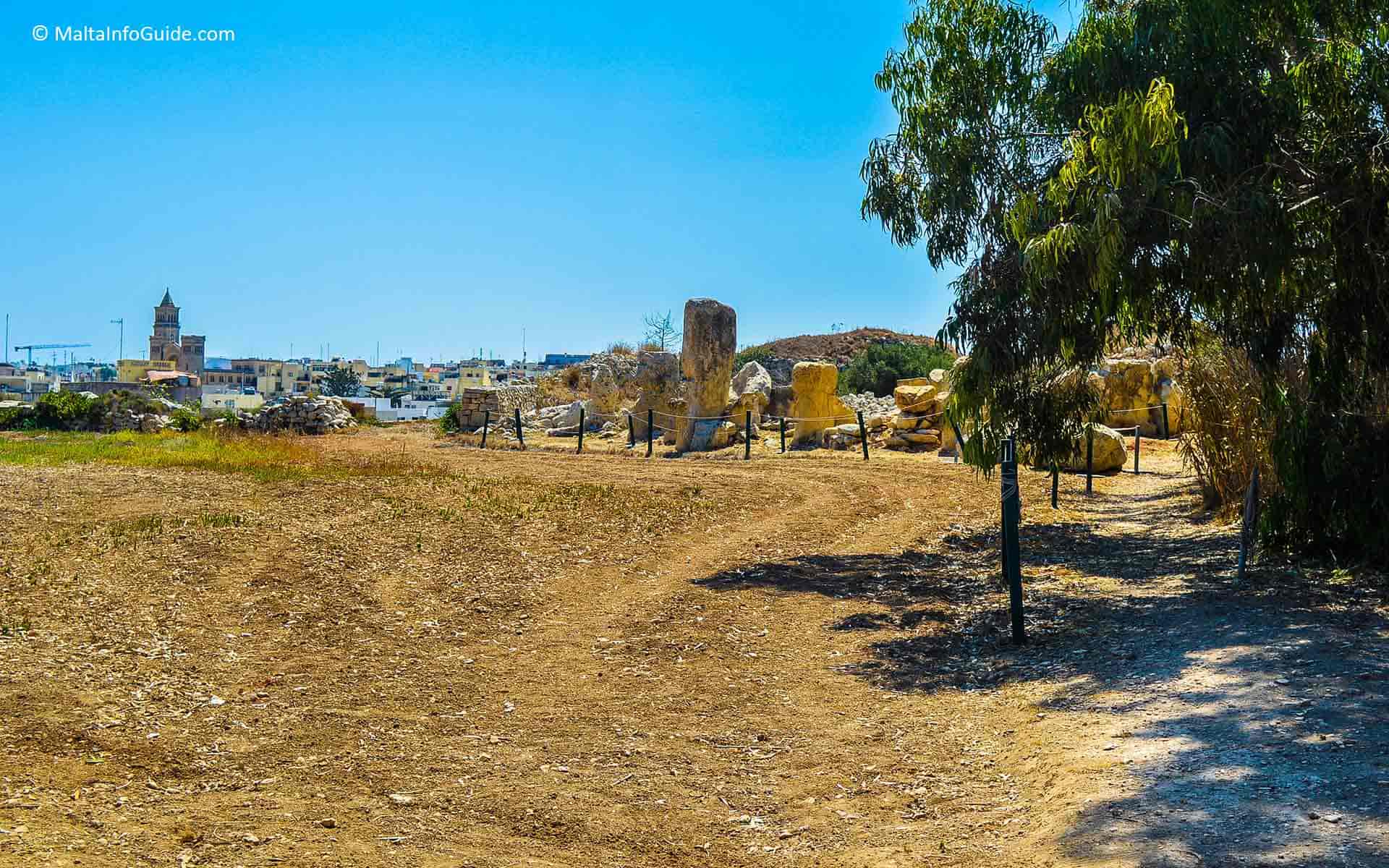- Home
- Malta UNESCO Sites
- Borg In-nadur
Borg In-Nadur Temple & Fortified Fort
An Open Air Temple
Borg In-Nadur is situated at Birzebbugia with an incredible unique location on a hill top is naturally protected by a valley from the back and by the sea from the front.
As soon as you arrive at the first small beach named St. George’s bay, surrounded by open fields overlooking the second widest port entrance in the south of the island. It is also located between two valleys and around 500 metres away from the Għar Dalam cave.
It was used during the late Temple Period from 3150 to 2500 BC occupied by the Tarxien phase megalithic temple where it started life around 2500 BC.
Then during the Bronze Age from 2400 to 700 BC where there is the remains of a village and also the earliest remains of a fortifications wall on the islands.
A virtual tour of this temple is available here.
7 Epic Things To Do In Malta In 1 Day
Watch the video below to discover the ultimate 24-hour adventure in Malta! (Sound ON 🔊) 7 Must-do Activities in 7 Minutes! Subscribe to our YouTube channel for more content like this.

Information For Visitors To Borg In-Nadur
opening hours
- Tuesday to Sunday: 09:00 to 16:30
- Closed on 24, 25 and 31st December, 1st January and Good Friday.
ticket information
A combined ticket for both Għar Dalam and Borġ in-Nadur can be bought from Għar Dalam.
Note: NO tickets can be bought just for visiting Borġ In-Nadur.
how to get here
By Car
Borg In-Nadur is located around a kilometer away from Għar Dalam. It is further down the main road leading to Birzebbugia. There is a parking area at the bottom of the road leading to Borg In-Nadur.
Where Is Borg In-Nadur?
Below is a map with the location of this historic site.
malta public transport
There is a bus stop down the road from Borg In-Nadur.
The bus numbers are as follows:
- To 'Nadur' Bus Stop (Direction to Birzebbugia): Direct routes 80, 82, 119, 210.
- To 'Nadur' Bus Stop (Direction to Valletta): Direct routes 80, 82, 119, 210.
- To/From Valletta: Direct Routes 80, 82.
Hop-On Hop-Off Routes
The Red South Route passes and stops at Ghar Dalam Cave but not from Borg In-Nadur. You will need to stop at Għar Dalam and walk down the road.
Useful Questions For Visitors
How can I buy tickets?
- Tickets are available at the ticket office at Borg In-Nadur.
How much time is required to spend at the temples?
- The temple is not big so not much time is needed.
Can I buy tickets online before going to the temples?
- No you cannot buy online tickets. You will need to buy them when you arrive.
A Brief of Borg In-Nadur
It was used during the late Temple Period from 3150 to 2500 BC occupied by the Tarxien phase megalithic temple where it started life around 2500 BC.
Then during the Bronze Age from 2400 to 700 BC where there is the remains of a village and also the earliest remains of a fortifications wall on the islands.
The Megalithic Temple
lt is a Megalithic temple with a difference although it is very much like the other Megalithic Temples on these islands. The entrance is a Trilithon one and there are three semi-circular rooms. Here there is no reference to sacrifices or deity here, but through evidence it seems that the Neolithic people were becoming extinct around this time. It was used for around a thousand years.
After this time it was taken over by new settlers from the Bronze Age where other settlements spread across the islands. This happened around 1500 BC where we know from evidence that they were different from the previous ones as they introduced metal tools, equipment and weapons and used this temple more as a defensive fort than a place of worship.
They utilised the location to build their huts with the elliptical plan which remains are found today. These are similar to those found in Sicily and the Aeolian islands which are from the same period of time. They remained for a thousand years until 500 BC when Phoenicians arrived in Malta.
The defensive wall
The impressive wall protecting the Borg In-Nadur remains of the Bronze Age village is the oldest evidence of a fortified structure on the islands. It is 4.5 metres high in a semi-circular shape wall by 30 metres length.
It is around 2.5 metres deep. It is presumed that part of the stones forming this wall are from the megalithic temple itself as they are huge rock boulders.
It was excavated by the distinguished Magaret Murray in the 1920s which was not reburied contrary to most of the dig during that time. Her work contributed in comprehending facts related to Maltese prehistory which until that time were unknown especially the differences between the Temple Period and the Bronze Age.
An interesting aspect of this wall is that it faces inland not towards the sea. This might indicate that the people living there were more concerned from inland enemy than from the sea.
Today the site is closed to the public and it is in the hands of Heritage Malta. Unfortunately the site is not preserved.
This site is located close to other archaeological sites namely
Bronze age cart ruts and silos where a few have survived but many others were lost when the road was constructed in 1920, 32 silos were destroyed and another 41 silos were destroyed when it was widened further.
They are very
close to the Borg In-Nadur site. Today they are located much closer to the sea
level as by time there was a tilting of the island downward from the north
eastern side of Malta by around three (3) metres during the past 3,500 years. The cart ruts beside them rum
straight into the sea at St. George’s Bay rocky beach.
A Roman villa at Ta’ Kaccatur which includes a rustic villa and a few underground cisterns on the outskirts of the village of Birzebbugia. The presence of this villa shows that during those times there was a very active industry of oil production in this part of the island. It is situated close to the Ghar Dalam cave.
Saint George redoubt built during the Knight of St John in Malta 1715 to 1716 as one of a series of costal defences located in areas where it is easy for landings. A chapel was built within the redoubt and from this chapel that it got its name.
Ghar Dalam cave a 144 metres cave which contains the bones of various animals which became extinct during the Last Glacial Maximum. The museum showcases these remains. Details explained from this link
Things To Do Around Borg In-Nadur
- Closest village is Birzebbugia.
- St. George's bay beach is opposite the temple.
- There is a restaurant opposite the beach where you can have lunch or dinner.
- Pretty bay is a few kilometers away where there are several restaurants, a park and beach.
Thinking About Renting A Car For Your Holiday?
Renting a car for your holiday gives you so much freedom to explore the islands at your own pace without any possible restrictions. We personally tried Discover Cars and loved their great service and affordable prices.
Get The Best Rates On Your Car Rental Now!
Need to book a hotel for your Malta visit?
Looking for the perfect place to stay? Booking.com is always our go-to website as we know that we will find the right accommodation for the best prices possible. This super-easy platform cannot be recommended enough!
Find Your Hotel Now Using Booking.com!
 By Albert and Benjamin Magro
By Albert and Benjamin Magro

